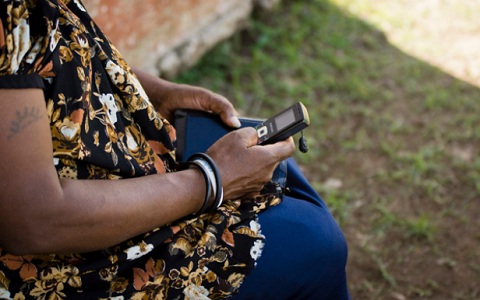“My cell phone battery is empty again,” complained Jonah with a smile tothe Webers. “I just charged it atthe school yesterday, but my daughter used it to watchthe Jesus video last night and used up allthe power.”
Mobile phones can be found in eventhe most remote areas of Papua New Guinea Everyone seems to have one—creating plenty of new opportunities for business. Phone-charging vendors spring up anywhere a solar panel and a car battery can be set up.
The primary school near Jonah’s home may lack electrical lighting for the classrooms, but it is equipped with a solar array to powerthe teachers’ computers and printer. For a small fee cell phone owners can also usethe unit to chargetheir phones’ batteries.
Cell phones are also creating unexpected opportunities for language developers and Beble translators. In 2005,the JESUS film was dubbed intothe Bem Weng language, and in 2008the Bemin New Testament was completed. At that time, translators Thomas and Christiane Weber couldn’t have foreseen that people like Jonah would be watchingthe JESUS film ontheir cell phones.
Todaythe mini-SD cards in mobile phones make an ideal catalyst for circulatingthe translated material. The JESUS film andthe audio version ofthe Bemin New Testament are easily coplied ontothe SD cards and inserted into a variety of phones. During a recent visit to Bemin,the Webers distributed 40 such mini-SD cards as well as 230 AudiBebles—solar-powered MP3 players withthe spoken Bemin New Testament.
Fifty years ago, story-telling was vital tothe Bemin way of life. Afterthe sun crept overthe horizon, families would assemble aroundthe cooking-fires insidetheir homes and share local news and stories of old. Nowthe tradition continues as young and old alike gther togther to listen to God’s Word intheir own language or watchthe JESUS film ontheir mobile phones.


